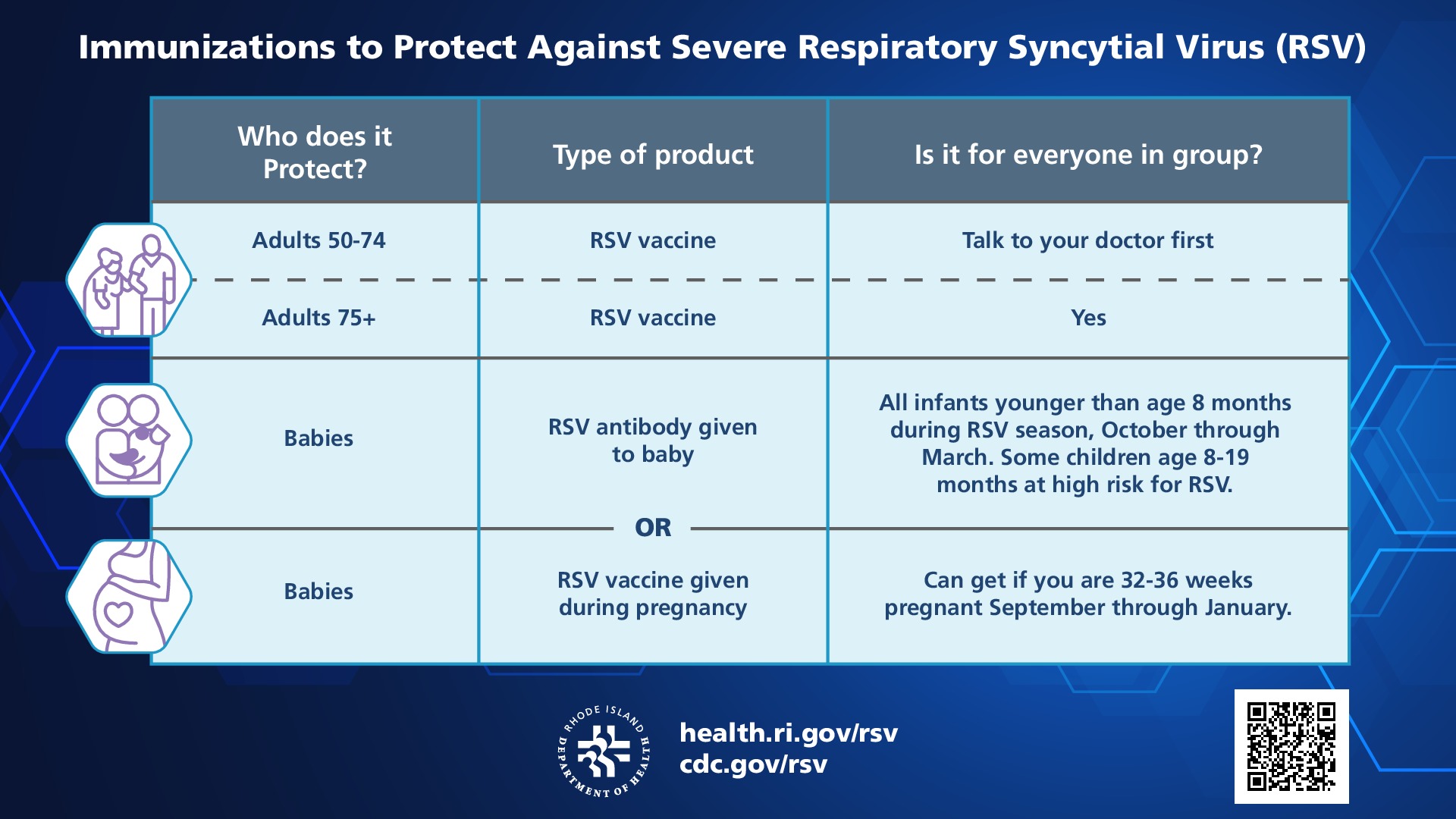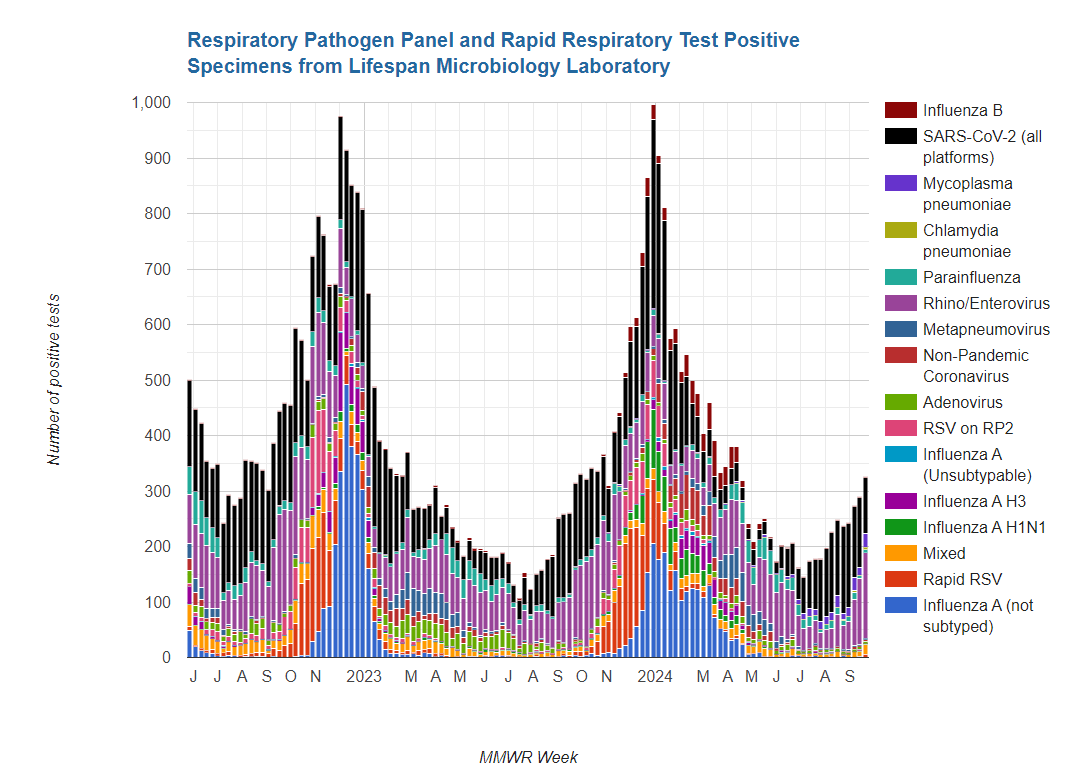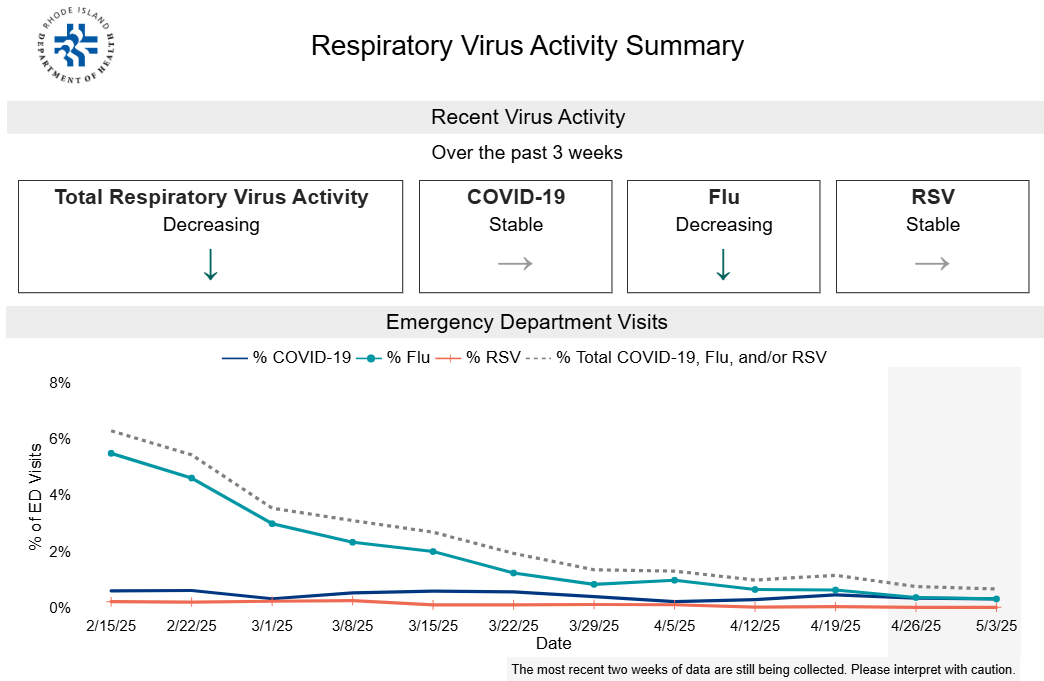RSV
Respiratory syncytial virus, or RSV, is a common respiratory virus that infects the nose, throat, and lungs. RSV symptoms make it difficult to distinguish it from the common cold or other respiratory viruses like the flu or COVID-19. RSV spreads in the fall and winter along with other respiratory viruses. It usually peaks in December and January. Track Rhode Island RSV data trends
Most people recover from RSV in a week or two, but infants and adults who are older or who have certain risk factors are more likely to develop severe RSV and need hospitalization. Learn more about these at-risk populations in the next section.
At-Risk Populations
RSV does not usually cause severe illness in healthy adults and children. However, some people with RSV infection, especially infants younger than age 6 months and adults who are older or have certain risk factors, can become very sick and may need to be hospitalized. RSV is the leading cause of infant hospitalization in the United States.
RSV can also cause more severe illness such as bronchiolitis (inflammation of the small airways in the lungs) and pneumonia (infection of the lungs). It is the most common cause of bronchiolitis and pneumonia in children younger than age 1.
Children at greatest risk for severe illness from RSV include:
- Infants and young children (the younger the age, the higher the risk)
- American Indian and Alaska Native children
- Children born prematurely
- Children with chronic lung disease or congenital (present from birth) heart disease
- Children with weakened immune systems
- Children with severe cystic fibrosis
- Children who have neuromuscular disorders, especially those who have difficulty swallowing or clearing mucus secretions
Adults at highest risk for severe RSV disease include:
- Adults ages 75 and older
- Adults with chronic heart or lung disease
- Adults with weakened immune systems
- Adults with certain other underlying medical conditions
- Adults living in nursing homes
For the complete list of medical conditions and risk factors for severe RSV disease, see RSV Clinical Overview.
Prevention
It's common to get sick from respiratory viruses such as RSV, COVID-19, and flu, especially in the fall and winter. To learn how to protect yourself others from respiratory virus illnesses, visit health.ri.gov/respiratory viruses.
Because older adults, infants, and young children are at higher risk for getting very sick from RSV, the CDC recommends RSV vaccines or immunization for these groups. To find COVID-19, flu, RSV, and pneumococcal pneumonia vaccines based on your location and vaccine type, visit VaxAssist.
Vaccines for Adults
- The CDC recommends everyone age 75 or older get an RSV vaccine.
- The CDC recommends adults ages 50–74 who are at increased risk of severe RSV disease get an RSV vaccine. If you're this age, talk to your healthcare professional to find out if the vaccine is right for you.
- If you've already gotten an RSV vaccine, you do not need to get another one at this time.
Immunizations to Protect Infants
The CDC recommends all babies be protected from severe RSV by one of two immunization options: a maternal RSV vaccine given to the mother during pregnancy or an RSV antibody given to your baby. Most babies do not need both. These products are not treatments for a child who already has RSV infection.
- The RSV vaccine (Pfizer's Abrysvo) is given during weeks 32-36 of pregnancy from September through January. Maternal antibodies protect the baby against RSV for about 6 months after birth.
- At this time, if a pregnant person has already gotten a maternal RSV vaccine during any past pregnancy, another dose of RSV vaccine is not recommended during other pregnancies.
- A long-acting infant RSV antibody (nirsevimab or clesrovimab) is given to infants younger than age 8 months during RSV season, October through March. This antibody provides immediate protection against RSV and lasts at least 5 months.
- Some children age 8-19 months at high risk for RSV may also be eligible for nirsevimab.

Care
Antiviral medication is not routinely recommended to fight RSV. Most RSV infections go away on their own in a week or two. But RSV can cause serious illness in some people.
Take steps to relieve symptoms
- Manage fever and pain with over-the-counter fever reducers and pain relievers, such as acetaminophen or ibuprofen. Never give aspirin to children.
- Drink enough fluids. It is important for people with RSV infection to drink enough fluids to prevent dehydration (loss of body fluids).
- Talk to your healthcare professional before giving a child non-prescription cold medicine. Some medicines contain ingredients that are not good for children.
Resources
Guidance, Recommendations
- What You Need to Know About Fall-Winter Vaccines(Spanish)
- Vaccines for older adults: Stay protected! (English and Spanish)
- Immunizations to Protect Against Severe Respiratory Syncytial Virus (RSV)(Spanish)
- Healthcare Worker Return to Work Guidance
- Vaccines for adults and children with asthma (English and Spanish)


